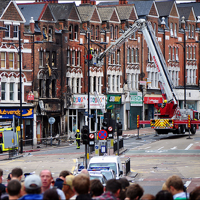The riots this past week in the United Kingdom, coming on the heels of the terrorist attack in Norway last month, the protests in Greece and the tsunami and subsequent nuclear accident in Japan earlier this spring, should be a wake-up call to Europe and the rest of the developed world that it cannot ignore the domestic side of the national security equation. It is time to dispense with the hubris of thinking that natural disasters, civil unrest or terrorism produces instability only in countries like Haiti or Iraq. And as Reuters correspondent Peter Apps notes, while a massive police presence in London has now tamped down the violence, "[the police], too, face the drastic spending cuts that will affect everything from the military to social benefits and inner-city services." Certainly, the unrest has shaken the perception of Britain as a global "safe haven."
But it also raises questions about the sustainability of Britain's recent strategic defense review, which translated projected budget cuts into scaled-back military capabilities. The notion that the British army might be called in to help secure the country from internal unrest was not on the agenda even a few months ago. And yet this week, Prime Minister David Cameron acknowledged, "It is the government's responsibility to make sure that every future contingency is looked at, including whether there are tasks that the army could undertake that might free up more police for the front line."
But John Schindler, a colleague here at the Naval War College, isn't so sanguine about the British military's capability to act as a panacea. "The U.K. is in a very tight spot here," he told me. "Having reconfigured the force for expeditionary warfare, plus the drastic Cameron cuts, the British army is caught. Since the U.K. lacks any paramilitary force like France's gendarmerie or Italy's carabineri, this [function] by default falls on the army. And the number of infantry battalions at home is now so small, I doubt the army actually could restore order in more than one or two cities at a time."

